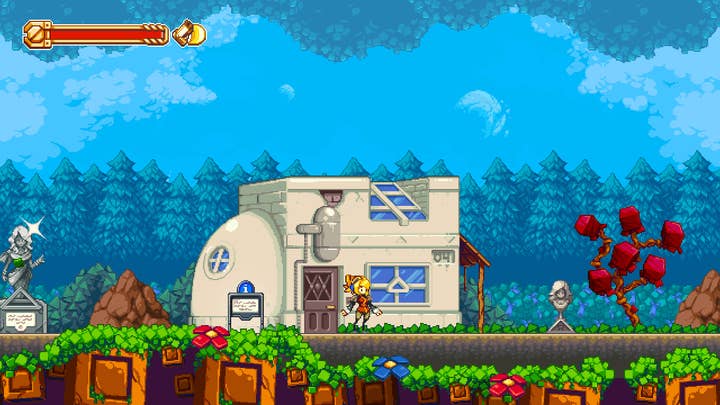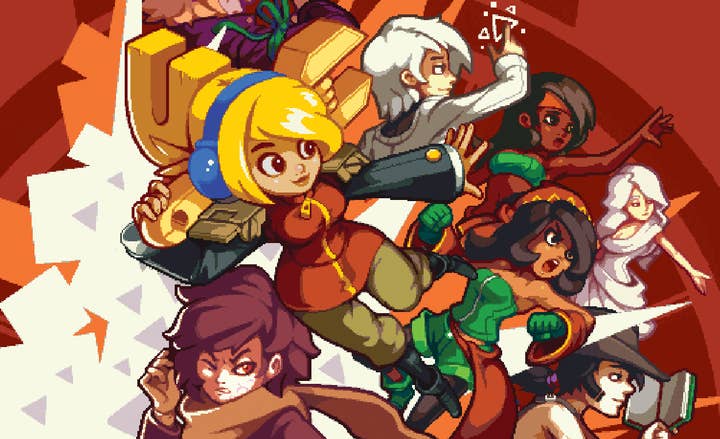Tearing down the lone developer myth
Iconoclasts creator Joakim Sandberg says developers should learn from his mistakes rather than follow his example
There's a romanticized notion in games of the lone indie developer: the auteur in full control of the creative process, a rare genius driven to realize an artistic vision, unadulterated by focus group feedback, market pressures, and other such commercial concerns shared by bean-counting AAA publishers. It's something many developers aspire to.
At first glance, Joakim Sandberg might seem to fit that mold. He's spent the last 20 years working on his own games alone, and his motivations certainly seem more creative than commercial in nature. But on closer examination, Sandberg's experience serves as a rebuke to the idea of indie auteurship as an aspiration. Appropriately enough, it is the story of his latest release, the Metroidvania-style game Iconoclasts, that at least partly undermines the myth of the lone developer.
"I don't know if it's selfishness, stubbornness, or being afraid of having my ideas shot down, but I haven't had too much of a desire to try [working with others]," Sandberg told GamesIndustry.biz recently. "I did try when I was much younger, but at that point everyone wants their own thing and it was just a bunch of arguments. I haven't tried since."
"I don't love showing my ideas out of a little fear of all my hard work being shot down by somebody"
It's an approach that has some significant benefits -- creative control, modest overhead -- but some equally obvious drawbacks. Game development is a complicated and time-consuming task in the best of times, and development where one person is doing all the work is bound to take longer. (Iconoclasts took a decade to develop.) And even if he isn't looking for collaborators to take over any of the creative chores, he still thinks he suffers from the lack of a sounding board.
"A huge problem for me automatically becomes that I keep my ideas very much to myself," Sandberg said. "I don't love showing my ideas out of a little fear of all my hard work being shot down by somebody, some detrimental attitude like that. But I think most of all it's the bouncing of ideas off other people that I don't get to do. So I don't get the affirmation right away if something is good or not until I've actually made it and had somebody try it, which can be sort of a waste of time if it's not good."
Fortunately for Sandberg, Iconoclasts is by most accounts quite good. It garnered honorable mentions in this year's Independent Games Festival categories for the Seumas McNally Grand Prize and Excellence in Visual Art, and carries an 87 Metacritic for the Switch and PC versions (the PS4 and Vita versions average an 83 from reviewers). That said, Sandberg doesn't think his solo approach to game development is one to be emulated.
"I always recommend that people don't follow in my footsteps for something that takes several years," he said. "It's been hard to decide exactly what was good and what was bad about the experience. It's something I still think about a lot."
That's not the only thing about Iconoclasts Sandberg still thinks about, as even a game developed by a single person requires compromises.
"Iconoclasts isn't a perfect expression because I had a lot of pressure on myself to actually be appealing"
"Iconoclasts isn't a perfect expression because I had a lot of pressure on myself to actually be appealing with certain features and order of events," Sandberg said. "'Maybe this should be more varied,' or 'Maybe that should be in the game.' I sort of feel like it tainted the expression in that way, and I kind of regret that in hindsight."
Part of the pressure he felt no doubt came from seeing the way the indie game market was evolving around him. While he was busy toiling away on Iconoclasts, the Metroidvania genre was experiencing a glut of high-quality entries. Sandberg namechecked Hollow Knight specifically, but we'll throw Ori and the Blind Forest, Salt and Sanctuary, Owlboy, Guacamelee!, Axiom Verge, La-Mulana, The Swapper, and Sundered on the list as some other strong entries in the genre that hit the market during Iconoclasts' development.
"Nobody should attempt to make those right now. They are extremely risky because people are so done with them and there have been such huge, polished ones that you can't really have a small one at the moment," Sandberg said. "It's going to come around, it always does. But look at Hollow Knight and the presentation of that game... That genre is kind of dead for the time being, unless you have a lot of backing and talent and good fortune."
The parade of high-quality competition didn't do much to help Sandberg's morale. "I'm not a very confident man in general, but it was definitely wearing down on me and [I was] wondering what I was really doing," he said.
"It's an unpopular thing to say, but I think gamers are being too pandered to"
Sandberg acknowledged that fear of being measured against the competition played a part in his decision to add "stuff I thought people wanted." For example, Iconoclasts has a tweak system: mods that confer slight gameplay bonuses, with players able to choose three to equip at any given time. Sandberg said the entirely optional feature was added very late in development, simply because he felt people would want something to collect in the game.
"The industry has moved so much toward people getting rewarded for almost every action they do, I just felt I had to have something resembling that," he said. "It feels kind of like a mistake in hindsight, but I felt people really had to be rewarded for everything they do... After the game was done, there was a lot of feedback of people saying, 'What's the point of this?' If it hadn't been there, maybe people would have said nothing and been more happy about it. It's hard to know."

That Sandberg would spend so long making a game entirely on his own and then (literally) tweak the creative vision in the hopes of pleasing someone else is a contradiction he's not entirely at peace with yet.
"It's an unpopular thing to say, but I think gamers are being too pandered to," Sandberg said. "As somebody who likes to create and express, I want gamers to be more receptive to artistic expression than 'Please me and make me feel good.' I want them to just want to experience what other people might have to say and maybe even learn something from it instead of just being fed through a theoretically eternal game with a few videos here and there for lore.
"My mental health is destroyed. For your own mental health, you need to not squander your friends"
"I just want to tell stories, and you can't tell every kind of story unless the gamers are receptive to taking what I have to say instead of just what they want to hear."
Given Sandberg's mixed feelings about the final product, even the game's warm critical reception wasn't as rewarding an experience as one would hope.
"Reacting to people's feedback when the game took ten years and you're sort of self-conscious about how pure the expression actually was, it really did wear down on me and I've had a lot of psychological issues since," Sandberg said.
A few months after Iconoclasts launched, Sandberg suffered a panic attack. Not knowing what to do, he called the hospital and they told him to come in. He's doing better now, but he describes it as a slow recovery.
"My mental health is destroyed. For your own mental health, you need to not squander your friends. You need to not have financial risk right at the start of making a big game. You need to make sure it works before you dedicate your life to it."
Sacrificing one's mental health for a game is also far from a reliable formula to produce a hit. For all Sandberg put into Iconoclasts' development, he's well aware the game was only completed through a string of good fortune.
"Always right before I was about to abandon the game or just feeling like it was falling apart, something always came up to help me"
"I got very lucky many times throughout development, money-wise," he said. "I didn't have to starve or anything, which is incredibly lucky. And I have to thank a bunch of people for helping me out all along the way. Always right before I was about to abandon the game or just feeling like it was falling apart, something always came up to help me. I can't recommend what I did just based on the fact that I just had a lot of fortunate events keep me [going] all the way to the end."
For a portion of Iconoclasts' development, Sandberg was living with someone who didn't make him pay a fair share of the rent. In 2012, a friend helped him get his previous project, 2008's Noitu Love 2, on Steam, which boosted sales significantly. In 2015, he signed a publishing deal that effectively paid him a salary through to Iconoclasts' release. And throughout the game's development, whenever things got tight there always seemed to be the offer of a timely animation project on the side to keep things going.
Going forward, Sandberg is clearly changing his development process.
"I won't sit every day of the week, almost all day for several years for one game all on my own, no," Sandberg insisted. "I don't want to do that again... For the next thing, I'm probably still going to be dumb enough to do it solo, but it's going to be much smaller. It's going to be dynamic content, and it's going to be 100% what I want to do. And based on the design of the project, I can show it sooner.
"And if that's not received well, I can just say 'Screw it, this isn't going to work. But at least it was entirely what I wanted to do.'"


